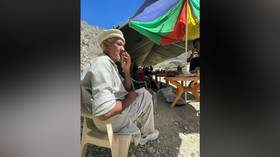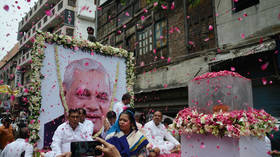India’s top court upholds decision to strip Kashmir of ‘special’ status

India’s Supreme Court on Monday upheld a decision made by the government of Prime Minister Narendra Modi in 2019 to repeal Article 370 of the constitution, which provided a special status to Jammu and Kashmir, a Muslim-majority region sandwiched between India, Pakistan, and China.
The special status that the India-administered Kashmir had enjoyed since 1947, when British rule over the subcontinent ended and India and Pakistan were born as two independent nations, provided it a certain level of autonomy.
According to Monday’s decision by the five-judge constitution bench, headed by Chief Justice Dhananjaya Yeshwant Chandrachud, the special status was a temporary constitutional provision that could be revoked.“Article 370 was an interim arrangement due to war conditions in the State. Textual reading also indicates that it is a temporary provision”, Chandrachud explained.
The bench noted that Jammu and Kashmir was not granted any sovereignty after accession to India.
The Supreme Court also urged the federal government to recognize Jammu and Kashmir as a state again, directing the relevant authorities to hold assembly elections by September 30, 2024. The region had its last assembly election in 2014, and its local legislature was dissolved in November 2018 through an order by the governor.
Monday’s verdict came in response to over a dozen petitions challenging the constitutionality of revoking the region’s special status, plus another decision to split it into two federally administered territories: Jammu and Kashmir and Ladakh. Both share a border with Pakistan and China.
Article 370’s key feature was that laws passed by the Indian Parliament did not automatically apply to Jammu and Kashmir, and it was the right of the local legislature to approve them by passing a parallel act.
The larger Kashmir region has been the focus of a major border dispute primarily between India and Pakistan since 1947.
The central government assumed complete control of Jammu and Kashmir in 2019, taking over policing duties, imposing internet restrictions, and implementing a curfew to prevent the disruption of public order by various “anti-national” elements.
The opposition, including Kashmir’s largest local parties, has vehemently opposed revocation of the region’s special status.
Repealing Article 370 has been one of the core election promises of the ruling Bharatiya Janata Party (BJP) for decades and was described in its election manifestos in 2009, 2014, and 2019. The article was revoked only months after the BJP came to power in 2019 for its second term.
Prime Minister Modi described the Supreme Court’s judgment as “a resounding declaration of hope, progress, and unity.” He wrote on X (formerly Twitter), “The verdict today is not just a legal judgment; it is a beacon of hope, a promise of a brighter future, and a testament to our collective resolve to build a stronger, more united India.”
In an affidavit to the court filed earlier this year, the federal government claimed that the 2019 decision to revoke the region’s special status had created “unprecedented development, progress, security and stability.”
Where India Meets Russia – We are now on WhatsApp! Follow and share RT India in English and in Hindi














